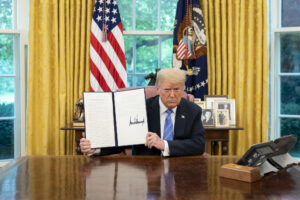These nationalist parties have finally clarified four things at once. By co-signing their declaration of war on the deepening of the European unity on Friday, they first killed the idea of an East-West divide within the Union.
This myth kept on growing. The fissure introduced at the last European Council by Viktor Orban’s homophobic laws had even almost made official the existence of two Europes, liberal in the West and reactionary in the East, when suddenly…
Let’s do the math. How many of the sixteen parties that have just declared their refusal to move towards a political unity of the Union were born in former Soviet bloc countries? Is it the overwhelming majority of them? At least a majority? Well, no! Poland and Romania, Estonia and Hungary, Lithuania and Bulgaria, that’s six in all compared to ten parties from the old free world, barely more than a third in a word.
One might object that of these six parties, two have been in power for many years, the Polish PiS and the Hungarian Fidesz. This is a fact, but should we forget that the Lega belongs to Mario Draghi’s coalition after having shared the Italian portfolios with the 5 Stars for a long time? Or should we ignore the fact that the FPÖ was recently in charge of key ministries in Vienna, that Mrs. Le Pen could threaten the re-election of Emmanuel Macron, that the political weakening of the PiS and Fidesz could well send them back into opposition in the Hungarian and Polish parliaments of 2022 and 2023, and that the rejection of authoritarian and corrupt powers is mobilising Romanians, Bulgarians and Slovenians en masse?
The nationalist and sovereignist far right is in no way a monopoly of the former Soviet bloc. This manifesto is proof of this and its second lesson is that the far right itself no longer dares to demonise the Union.
In the last French presidential election, Ms Le Pen called the European Union a “prison for the people”, applauded the Brexit and wanted to leave the euro. Her friend Salvini was on the same line but they have now signed a text recognising that “the integration process has done much to create lasting structures of cooperation and maintain peace, mutual understanding and good relations between states”.
“This work must continue,” consider therefore these parties, who seem to have finally understood that Europeans were rejecting the idea of going back on their unity by abandoning the Union. Yesterday, the far right was totally Europhobic, but last Friday it rallied to the European Union by acknowledging its entrenchment. But what does the extreme right propose to the 27 nations that make it up?
Well, at a time when we need to lay the foundations of a common defence, invest jointly in the industries of the future, build a pan-European public health policy, fight together against global warming and assert our autonomy on the international scene so as not to be marginalised by the Sino-American tug-of-war, the sixteen propose to move on… to a standstill.
They are not proposing new ideas, let alone new policies. No, quite the contrary, because just when we should be learning to move forward by qualified majority voting and no longer by unanimity, when we should be able to decide and act without missing any more trains, the extreme right proposes to stick to this requirement for consensus which slows down the functioning of the Union so much and paralyses it so often. It is necessary to stay there, it says, in order to respect the sovereignty of nations, their ‘traditions’ and their Judeo-Christian heritage.
To put it bluntly, the third lesson of this text is the intellectual indigence of those parties who confuse traditions with a refusal to move, the heritage of the past with a stagnation, reforms with a return to the past. As for the fourth lesson of this declaration of war on the emergence of a political Europe, it is that the European far right is an improbable mishmash of (Flemish) opponents and (Spanish) supporters of national unities, defenders and critics of social protection, close friends and irreducible enemies of Mr Putin. It is understandable that these people do not want a political Europe. They would be unable to govern it.



